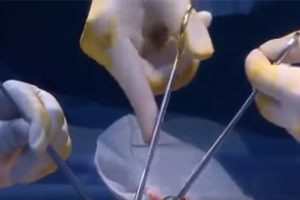
More Unsanitary Practices Endoscopy Center of Southern Nevada. The unsanitary practices employed by the Endoscopy Center of Southern Nevada have turned out to have been much worse than first reported. In addition to reusing syringes and drawing from single-dose medicine vials for multiple patients, the Endoscopy Center of Southern Nevada regularly performed 2-minute surgeries and reused […]

More Unsanitary Practices Endoscopy Center of Southern Nevada. The unsanitary practices employed by the Endoscopy Center of Southern Nevada have turned out to have been much worse than first reported. In addition to reusing syringes and drawing from single-dose medicine vials for multiple patients, the Endoscopy Center of Southern Nevada regularly performed 2-minute surgeries and reused other disposable devices. These revelations have caused some to speculate that the reused syringes and medicine vials might not be the primary cause of a hepatitis C outbreak linked to the Endoscopy Center of Southern Nevada, but health investigators say that is not likely.
In February, the Southern Nevada Health District sent letters to 40,000 people treated at the clinic, advising them to get tested for hepatitis B and C, and HIV. The Endoscopy Center of Southern Nevada has been under investigation since early January, after health officials learned of three people who had been diagnosed with hepatitis C after being treated there. Ultimately, the Southern Nevada Health District said a total of six people were known to have contracted hepatitis C after being treated at the Endoscopy Center of Southern Nevada. Five of them were treated the same day in late September; the sixth is believed to have been infected in July, the district said. The Southern Nevada Health District investigation revealed that “unsafe injection practices related to the administration of anesthesia medication might have exposed patients to the blood of other patients.” In March, a seventh hepatitis C victim, who had been treated at a clinic owned by the same group that owns the Endoscopy Center, was identified.
The hepatitis C virus may have been spread when clinic staff reused syringes and used a single dose of anesthesia medication on multiple patients, the district said. A syringe would become contaminated by the backflow of blood when patients with a blood-borne disease were injected with medication, health officials said. That syringe, in turn, would be reused to withdraw medication from a different vial. That vial could become contaminated and result in infection.
But now it appears that may have just been the beginning of the dangerous methods employed by the Endoscopy Center. According to a report in the Las Vegas Sun, the clinic regularly engaged in other dangerous practices. Several staff members told investigators that biopsy equipment labeled for single use was reused for multiple patients after disinfection. Records seem to confirm this: 7,800 biopsies or polyp removals were performed in 2007, but only 6,200 biopsy forceps or polyp removal wires were purchased.
The clinic’s staff also told investigators they’d reused bite blocks – devices put in patients’ mouths for some procedures – which cost about $2.25 each. According to the Las Vegas Sun, the clinic’s purchasing records show it bought only about 2,000 bite blocks in 2007, when about 5,800 upper endoscopy procedures, which call for use of the blocks, were performed there. One clinic staffer told investigators that they were permitted to use only four bit blocks each day in each of the Endoscopy Center’s procedure rooms.
The Las Vegas Sun also is reporting that on Sept. 21, 2007 — one of the dates on which hepatitis C was passed to patients — one colonoscopy lasted only two minutes and another only three minutes. Several staff members told investigators that anesthesia times had been incorrectly reported to allow for additional billing. This could be insurance fraud and is the subject of an investigation by the Nevada attorney general’s office and the FBI.
The personal injury attorneys at Parker Waichman LLP offer free, no-obligation case evaluations. For more information, fill out our online contact form or call 1-800-YOURLAWYER (1-800-968-7529).


